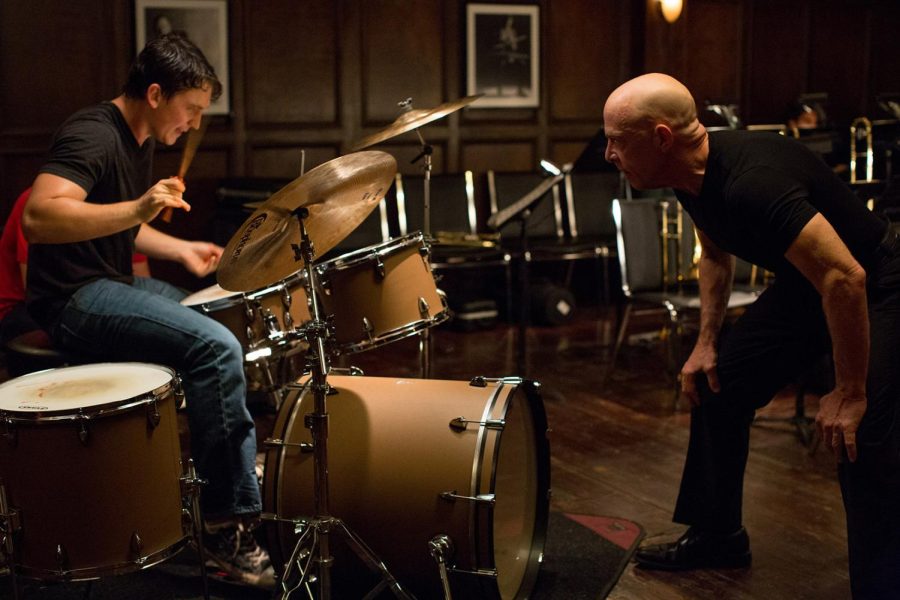A Deep Dive Into Damien Chazelle: Whiplash
To some, movies are entertainment, and at their surface, that’s true; however, when you look deeper, movies become an art form, a creative expression with layers that, once peeled back, will change your entire perspective on the film. One such film like this is Damien Chazelle’s 2014 blockbuster Whiplash. What started out as a discarded screenplay turned short film became a multi-award winning, critically acclaimed, timeless hit about a 19-year-old’s journey as a jazz drummer. The film focuses on Andrew Neiman (Miles Teller), a 19-year-old jazz drummer attending Shaffer Conservatory in NYC. Determined to be recruited into the conservatory’s studio band, led by Terence Fletcher (J.K. Simmons), Neiman practices day and night, eventually being noticed by Fletcher, and thus begins the opening sequence.
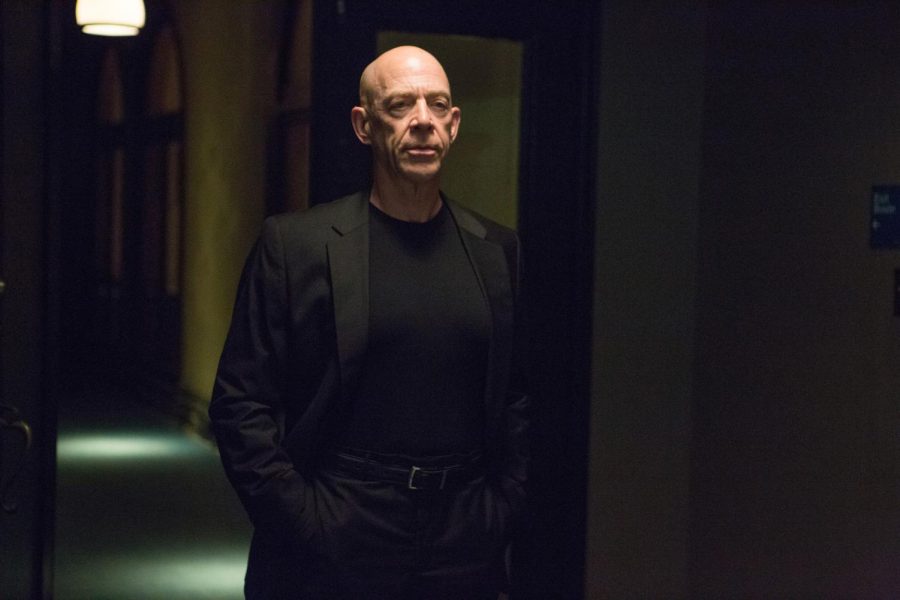
Like all of Chazelle’s films, color plays a critical role in Whiplash. As the film opens, we see Neiman in a white t-shirt, a detail that, too many, may seem unimportant; but one could not be more wrong. The color of an actor’s clothing in Whiplash is used to define the power dynamic between those in the scene and show Neiman’s growing obsession and his eventual total consumption of self by passion. The white t-shirt worn by Neiman represents innocence, a healthy dedication to the craft; however, as his obsession grows, it darkens, going from a light gray to midnight black, representing his suicide of the mind. We see many instances of this throughout the movie: Fletcher’s consistently black outfits, the Neiman family dinner, and much more. One of the most fascinating uses of this narrative device is after Fletcher is fired and Neiman is kicked out of the Shaffer Conservatory. We see Neiman walk into a club, where Fletcher, no longer conducting, is seen playing piano with a small jazz band, wearing what is not a black t-shirt, his staple outfit. This represents his loss of control; while his shirt is still a dark tone, it is no longer black. He no longer has the power and control over people he once did, and as such, he cannot be represented by a midnight black outfit.
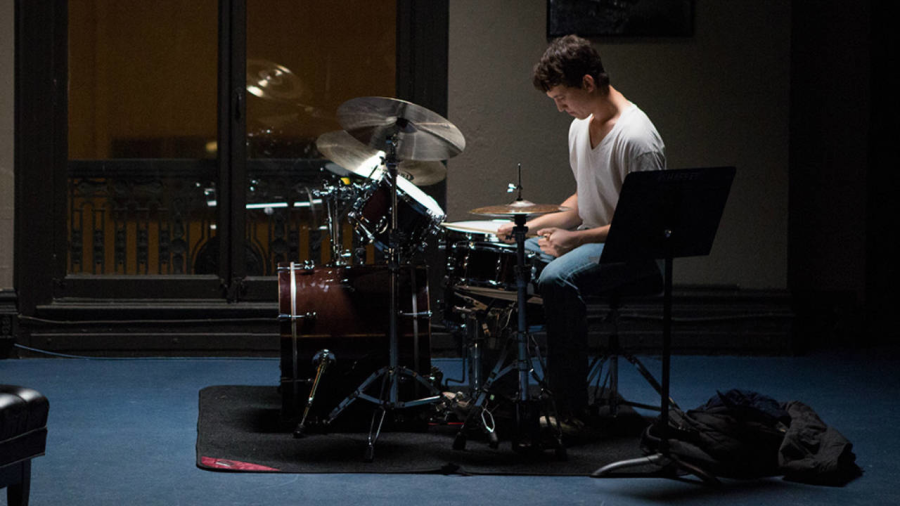
Fletcher’s style of conducting at the Shaffer Conservatory ultimately led to his being fired for gross misconduct. His intense, borderline psychotic method of leading the Shaffer Studio Band is a constant seen throughout the film’s entirety. We learn that this is not a new practice and that Fletcher has had a pattern of abuse when it comes to the members of his studio band. A prime yet tragic example is Sean Casey, a former student of Fletcher who, we learn midway through the film, has died. Fletcher enters on the verge of tears, telling his students about Casey, how talented he was, and how he went from an underclassman in a practice room to first chair at The Lincoln Center, one of the most prestigious bands in the country. Fletcher plays Casey’s music and asks that his student listen. We realize that to Fletcher, Casey is nothing more than a musician, an absence of humanity displayed by Fletcher that you do not notice until reflecting upon the film. We later learn that Casey’s death was due to his suicide, a byproduct of anxiety and depression, which he developed while under Fletcher’s instruction.
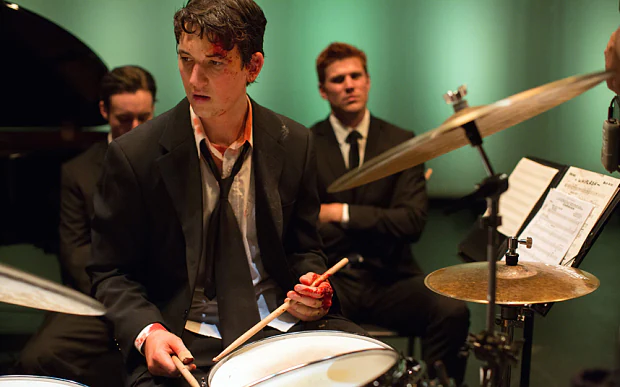
Whiplash forces the audience to reconcile with themselves whether Fletcher’s actions, actions which lead to the death of Sean Casey, are ultimately justified because of the outcomes they provide. We see this in the overarching plot of the film, as Fletcher slowly pushes Neiman to the edge, testing the limits of his ability and then challenging him to go past them. Ultimately this causes Neiman to sever all close relationships he has, and drumming becomes his life. We see Neiman’s final descent into madness when he forgets his drumsticks at the car rental dealer and he fights with Fletcher to maintain his spot as a core drummer. As he races to retrieve his drumsticks, he speeds back to the concert hall, flipping his car in the process. We see a bloody, disoriented Andrew Neiman crawling from his totaled car. As a worried passerby attempts to get him medical attention, he pushes them away, hobbling back to the concert hall, and after arriving, begins to play. Neiman, bloodied and injured, pushes his limits once again, but this time he cannot push past, his rhythm begins to falter, and he slowly begins to lose his grip on his sanity, ultimately attacking fletcher and (making an attempt at) assaulting him.
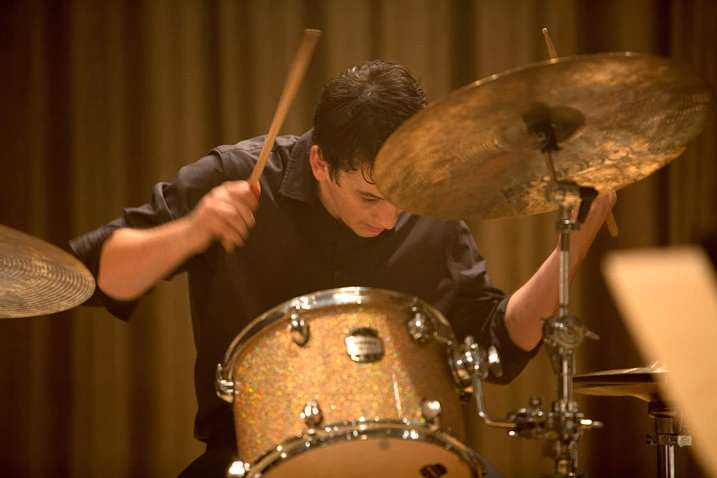
All this build-up leads us to Whiplash’s spectacular ending. Neiman is invited by a disgraced Fletcher to drum for him in the upcoming JVC Jazz Festival, accepting his offer Neiman sees this as a final opportunity at redemption. Having newfound confidence, Neiman calls up Nicole, who I will discuss later, inviting her to his performance only to learn that she now has a boyfriend, much to Andrew’s dismay. Upon arriving, Neiman learns that Fletcher set him up; the familiar pieces he informed him would be performed included a piece that Neiman had never practiced during his tenure at Shaffer. Neiman is humiliated in front of everyone in attendance, and we see a defeated Neiman run off stage, greeted by his Father, who embraces his seemingly distraught son. In a surprising twist, Neiman pulls out of the hug, darting back to his drum kit; much to Fletcher’s confusion, Neiman begins to play, and play he does. Neiman steals the show from Fletcher, becoming the conductor of his own jazz band. We feel a sense of pride seeing Neiman “stick it” to Fletcher, showing him that he is one of the “Greats” and not just another sorry drummer who gave up. To some, they may even see a vindication of Fletcher’s teaching style, his molding of a modern Charlie Parker, and his abuse vindicated by his magnum opus, Andrew Neiman. We see Neiman’s father, now leaving the concert hall, watching his son be consumed totally by his passion, now turned obsession, and what on my first viewing I believed was a look of pride, I realize now is a look of horror, the horror of a Father who realizes his son is gone, replaced by this obsessive percussionist who shares his face. The film closes before the end of the performance, so we are left without knowing if Neiman’s antics were well received by anyone other than Fletcher. We may never know if Fletcher’s vindication also meant Neiman’s retribution.
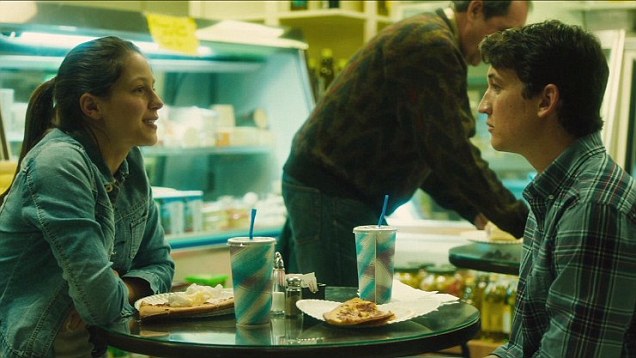
Shifting both tone and subject, I’d like to discuss the relationship between Andrew and Nicole, the first time we see one of Damien Chazelle’s favorite subplots. The film establishes from the beginning that Andrew is a regular at the theater where Nicole works, so much so that she comments on the change in Neiman’s order. As the film progresses and Neiman’s self-esteem grows, and his confidence becomes more pronounced, he builds up the courage to, albeit awkwardly, ask her out on a date. Their relationship is not shown as a significant plot device within the movie, but it is established that they are, in fact, in a relationship, as seen by the break-up scene later in the film. At this point, Andrew’s obsession with becoming the next Charlie Parker, and his almost psychotic dedication to it, are seen when he ends his relationship with Nicole. He tells her that she is nothing more than a distraction, an obstacle in his journey to becoming great, to which she asks him, “Are you not already great?” His response, shifting his goal, making it clear what he truly desires: “One of the greats.” His obsession with success stood in the way between him and love, and his inability to balance his craft with his relationships is a trope seen time and time again, each in different ways, throughout Chazelle’s lineup. It is not until the end of the film that we see this come full circle, once again Neiman has no one other than his Father, his drums, and his sense of self, his yearning for connection brings him back to Nicole, the only person disconnected from Shaffer, whom he cared for (once again besides immediate family). It is then that he learns she has moved on, informing him that she now has a boyfriend, a fact Neiman seems unable to grasp because he knows nothing other than himself, and to him, Nicole was the only one he ever had.
Whiplash is arguably one of the greatest films ever made, a story of obsession and suicide of the mind that forces audiences to reconcile within themselves the ethics of Fletcher’s behavior. Damien Chazelle’s freshman release serves as a social commentary on the ethics of direction, justification, and vindication of abuse when it results in success. Andrew Neiman serves as a “what not to do” for aspiring dreamers worldwide, showing that, while you may become one of the greats, you risk doing so at the cost of everything you know, even yourself. In giving Whiplash an attempted “honest” and “objective” rating, I find myself clouded by personal bias. Perhaps I am just fond of the use of music and plot devices not commonly seen in other movies, but I feel as if the only thing I can do is to place Whiplash at a 10/10, in terms of quality relative to all other movies I’ve seen.
